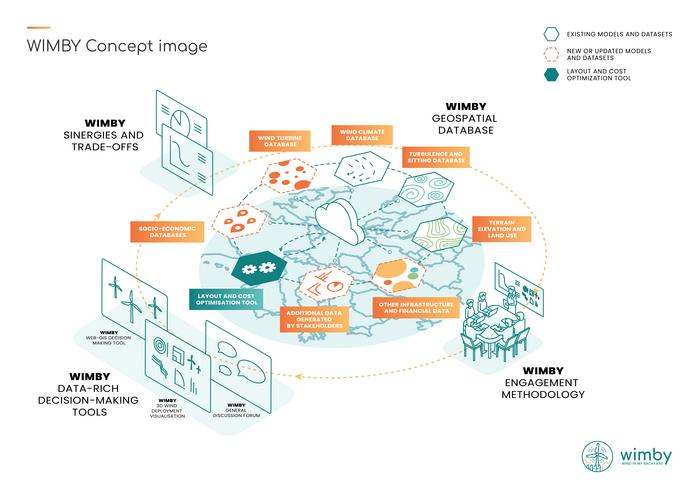IIASA researchers are participating in a new Horizon Europe project that will develop innovative tools to facilitate citizens and stakeholders’ interaction, in particular around knowledge sharing, collaborative evaluation of impacts, mitigation of controversies, and social innovation potential of new onshore and offshore wind power deployments.

Credit: WIMBY
IIASA researchers are participating in a new Horizon Europe project that will develop innovative tools to facilitate citizens and stakeholders’ interaction, in particular around knowledge sharing, collaborative evaluation of impacts, mitigation of controversies, and social innovation potential of new onshore and offshore wind power deployments.
The Wind in my backyard (WIMBY) project uses holistic modeling tools to advance social awareness and engagement on large wind power installations in the EU. According to the researchers, WIMBY can pave the way for a greener and more sustainable future by facilitating the acceptance of wind farms that are both widely embraced by the public and economically viable, while acknowledging and addressing the concerns of local communities and considering ecological aspects. The project will collect real-world data on four pilot sites located in Austria, Italy, Norway and Portugal, and directly engage local communities to identify the factors influencing the public attitude towards wind power and its applications. The selected pilot cases cover a wide range of geographical, technological, cross-societal and ecological characteristics that ensure that the developed tools are relevant and useful both to wind power developers and to citizens, promoting a just transition towards future energy citizenship.
“Climate change will have a significant impact on people and nature in the coming decades unless further steps are taken to reduce the share of fossil fuels in the energy mix. Wind power can play a significant role in decarbonising our economy. However, wind turbines, which are becoming increasingly large, can present a collision threat to flying animals, such as birds and bats,” explains Adrienne Etard, a researcher in the Biodiversity, Ecology, and Conservation Research Group of the IIASA Biodiversity and Natural Resources Program.
To inform decisions about where wind turbines can be deployed at the continental scale, the research conducted at IIASA as part of the WIMBY project focuses on assessing the impacts of wind farms on birds and bats, and investigates which species are at most risk. Wind-farm deployment can be coupled with solutions to minimise both collision risks and energy losses, such as anti-collision markers, monitoring, and operating restrictions during high-risk periods.
“Ensuring that wind farms do not exacerbate the risks facing biodiversity, and in particular that they are deployed in areas where they can be the least harmful to flying animals and with appropriate mitigations measures, can allow us to harness the benefits of wind-power technologies while minimizing other impacts on the environment,” Etard adds.
Although wind power is considered among the most promising solutions to reduce carbon emissions and mitigate climate change, it has also met with resistance from restrictive regulations and local communities. The WIMBY project addresses these challenges by actively involving citizens and stakeholders in the whole process of development, collecting their concerns and feedback. Over the next three years, researchers working on this initiative will cooperate to develop a new set of tools that will promote the direct engagement of local communities in the planning, implementation, and longstanding coexistence with wind farms.
To promote open and transparent communication, the WIMBY Consortium has engaged a multidisciplinary team that will co-develop a series of interactive engagement tools that can be used by anyone, both expert and non-experts, facilitating widespread participation in the different phases of the project.
The tools will include a Web-GIS platform, a 3D immersive environment and an open discussion forum, enabling users to exchange opinions and make informed decisions. The WIMBY Consortium’s 16 European partners will share their multidisciplinary expertise to address all the points that come into play in the development of wind energy: studies of the territory, both with regard to impacts on biodiversity, landscape and communities; technical studies for the development of the most suitable and user-friendly tools; citizen science and social research methodologies to develop best practices to involve local stakeholders in decision-making processes.
WIMBY is a project that puts the needs of citizens and communities at its centre, striving to find the best compromises and tools to break down the barriers against the development of wind energy and contribute to the joint action to decarbonise the European Union. All European citizens are invited to follow the project and be an active part of the research, by reading the most recent updates and achievements on the official website and main social media.
This project has received funding from the European Union’s research and innovation programme Horizon Europe under the grant agreement No. 101083460.
Further information:
https://cordis.europa.eu/project/id/101083460
About IIASA:
The International Institute for Applied Systems Analysis (IIASA) is an international scientific institute that conducts research into the critical issues of global environmental, economic, technological, and social change that we face in the twenty-first century. Our findings provide valuable options to policymakers to shape the future of our changing world. IIASA is independent and funded by prestigious research funding agencies in Africa, the Americas, Asia, and Europe. www.iiasa.ac.at



